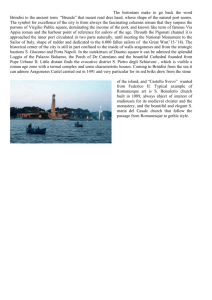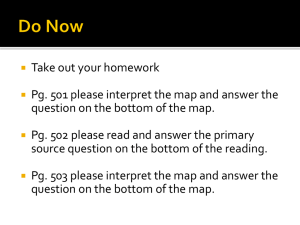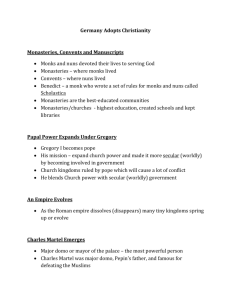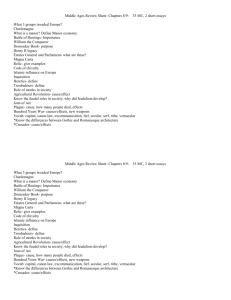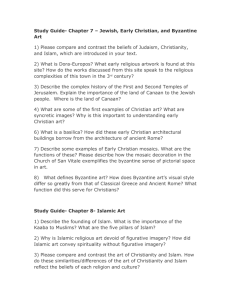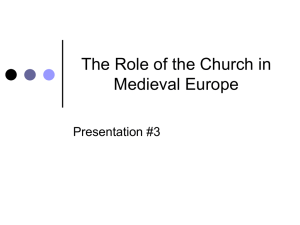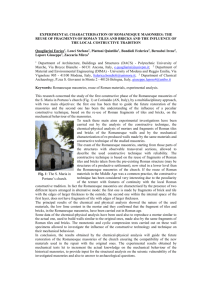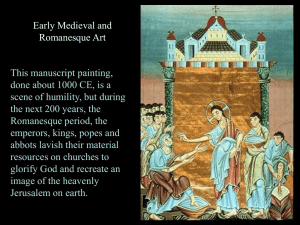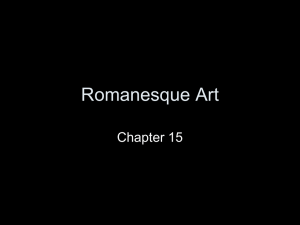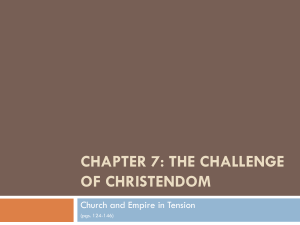Middle Ages
advertisement
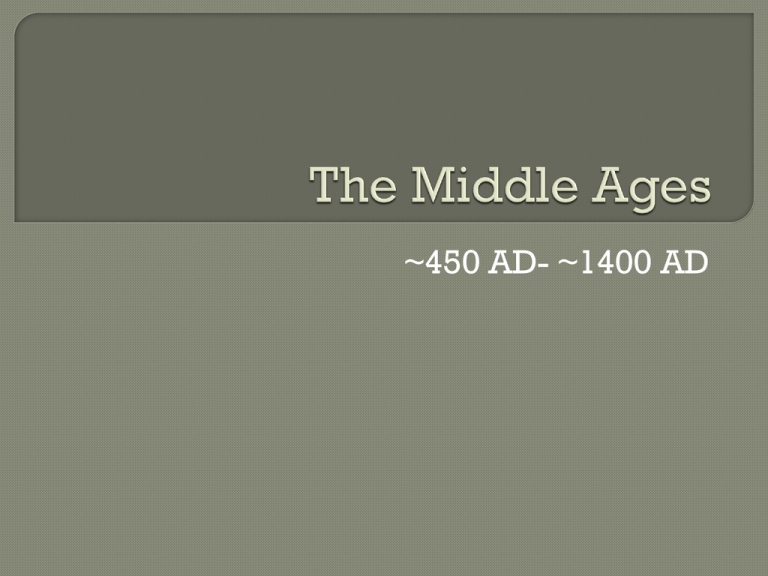
~450 AD- ~1400 AD Invasions end Roman protection of empire Advances slow and people begin to forget the Roman’s advances • Literally, people lived right next to a Roman aqueduct, but had no idea how to make it Breakdown of trade: money became scarce. Cities abandoned – no longer center of economy or administration Population became rural. Decline of literacy – priests were the few that were literate. Languages slowly changed from Latin (Romance languages) After the decline of the Roman Empire small kingdoms sprang up all over Europe. The largest and the strongest was controlled by the Franks • Lead by Clovis – first Christian king • Area that is now France • Greatest king was Charlemagne • most powerful king in Western Europe • encouraged learning Lack of a strong central government Church is powerful King less powerful Europe divided into thousands of small feudal kingdoms Rural Education Less decreases trade Barter system Living conditions harsh Laws based on customs Feudalism becomes the dominant political system. At its head is a king. The king trades land to a lower noble for loyalty. Fief: Vassal: Manor: Serf (or peasant): Feudalism Provide knights in times of war Fiefs – land grants Military protection Fiefs – land grant service protection Based on mutual obligation Nobles constantly fought each other Defend estates Seize new territories Increase wealth Kept Europe fragmented Glorification of warriors Economic system of the Middle Ages Manor – self sufficient farming communities Little trade between manors Typical had 200-300 people Heart of the manor was the manor house / castle Europe continues to suffer invasions • Further disrupts trade • The need for protection strengthens feudal system Lived in Denmark and Germanyinvaded/immigrated to England between 500- 700 AD The modern name England or English comes from Angle • Anglo- is also a root word What is an “Anglophone?” Also, the French word anglais (English) Some people think the word “Yankee” comes from a corruption of the pronunciation “l’anglais” People from Scandinavia (Norway, Sweden, Denmark) • Due to rising populations in those countries, Vikings sought places to expand- so they started sailing to Western Europe and further • In the process, became famous for raiding towns and monasteries throughout Western Europe By the 900’s AD, the Vikings (also called Northman, Norseman, and Norse) are beginning to settle in parts of Russia, France, Ireland, and England • In fact, modern day Normandy in France takes its name after the Northman Nomadic people from central Europe • Modern day Hungary Raided villages and monasteries throughout Germany, Italy, and France often selling people into slavery Chivalry – a complex set of ideals, demanded that a knight fight bravely in defense of three masters 1. His feudal lord 2.His Heavenly Lord 3.His Lady Meant to protect the weak and the poor Be loyal, brave, and courteous Sons of nobles began training at an early age for knighthood Page – at 7 they were sent to another lord to be trained Squire – at 14 they act as a servant to a knight Knight- at 21 they become a knight and gain experience in local wars and tournaments Tournaments – mock battles that combined recreation and combat training Fierce and bloody competitions Beginning with Clovis and cemented by Charlemagne was an alliance between the Catholic Church and the secular (worldly, not religious/spiritual) rulers like kings. Papal bull is a written order by the Pope Used by the Church to justify actions like going to war Also used to control kings in Europe Set of church laws that govern religious practices. Excommunication means you get thrown out of the church. For kings, it can also mean vassals no longer owe loyalty. Even stronger than Excommunication is interdict, which means the Church will not perform the Sacraments (baptism, marriage, last rites, etc.) in the King’s land • Catholics believe this means you would go to Hell If the Pope wanted to control a King, he would threaten to excommunicate him or even his whole kingdom. This usually forced the King to do what the Pope wanted him to do. In this way, the Church controlled many of Europe’s kings The Catholic Clergy (priests, leaders of a religion): Pope Cardinals Bishops Parish Priests The People Preserver of learning Art Shelter for poor Church offered salvation sacraments through the Amassed wealth Owned land Some where dishonest Political involvement Corruption Monasteries + Monks Monasticism: St. Benedict – Founds Benedictine Monasteries. Monks swore to poverty, celibacy, obedience Copied books including Bible- preserved writing monks became missionaries to the “barbarians,” like the Germanic peoples. Raise your hand. Tell me if it’s Romanesque, Islamic, or Classical (Greek/Roman) Classical- Triumphal Arch Islamic Romanesque Islamic Romanesque Classical- Ampitheater Islamic Romanesque Classical Classical Romanesque (The Church on Left)
